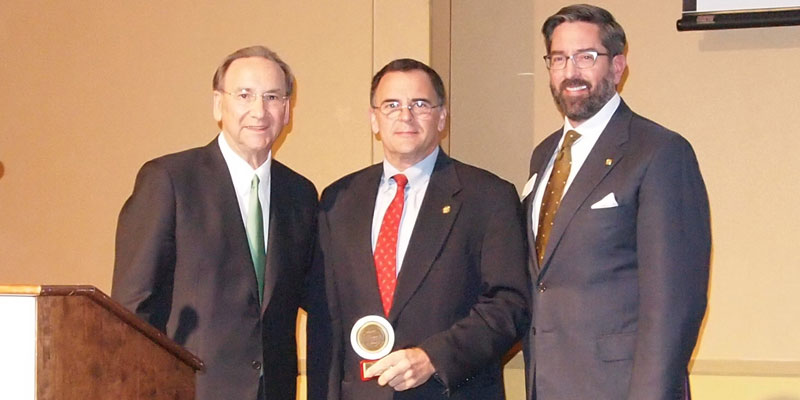
MONTGOMERY, Ala. — The Business Education Alliance of Alabama (BEA) in two new reports highlights gains made in the high school graduation rate and outlines a new strategy to ensure that the best teachers are recruited to, and remain in the classroom.
At the Business Council of Alabama’s (BCA) Governmental Affairs Conference last Saturday, BEA Chairman and President Joseph B. Morton, Ph.D., and BEA Finance Chairman Jay Love delivered the BEA’s 2015 Progress Report, an update of last year’s research report, and introduced the 2015 update that emphasizes the importance of quality teachers.
The 2014 BEA report, Obstacles Into Opportunities, outlined how Alabama can achieve a 90 percent high school graduation rate by the year 2020. The report summarized that a 90 percent graduation rate is the economic equivalent of landing an industrial mega-project every year.
“The 2014 BEA research report on achieving a 90 percent high school graduation rate in Alabama by 2020 outlines the high quality programs that have the greatest promise for success,” Dr. Morton explained.
Dr. Morton said that Alabama’s public schools reported an 86 percent graduation rate in 2014, up from 72 percent in 2011.
Based on the Obstacles into Opportunities report, the BEA identified key funding elements critical to success, and the Alabama Legislature responded with $29.2 million in new dollars in the 2016 Education Trust Fund budget to address those needs. Of that, $6 million was designated for high-quality assessment for students in grades 3-12 to measure improvements, maintain integrity and accountability, and report results to the public.
“We’re thankful for the legislative support and we want to continue emphasizing our report from last year,” Love said.
“The focus now is on teacher quality,” Dr. Morton told the BCA board of directors.
The 2015 BEA report, Teachers Matter: Rethinking How Public Education Recruits, Rewards, and Retains Great Educators , focuses exclusively on teachers and how to recruit, retain and reward the best teaching corps possible for Alabama’s public schools by reviving successful initiatives and creating new ones.
“This important report advocates key ways to establish a teacher recruitment and mentoring program to ensure that high-quality teachers prepare our children for their adult lives in the world of business and their further education,” said BCA President and CEO William J. Canary. “It is an important conclusion with ramifications for Alabama’s economic and social future.”
The report advocates higher entry standards to and a higher bar for graduation from teacher preparation programs by developing strong partnerships with local school systems, by utilizing a well-designed teacher evaluation program, and by rewarding and challenging teachers.
The report advocates that the Legislature revive and revise the Alabama Teacher Recruitment Incentive program with an initial investment of $3 million, and create a pool of scholarships and incentives to address teacher shortages, with emphasis on science, math, and technology for the 21st century economy.
According to the report, the Legislature also should renew support for the Alabama Teacher Mentoring Program with an estimated annual appropriation of $4 million. While it existed, ATMP paired experienced teachers with beginning teachers and provided a $1,000 stipend for mentors to support counseling and coaching throughout the school year to new educators.
To recognize great teachers and magnify their impact, the report says the Legislature should also sponsor the development of new teaching roles to allow for career growth within teaching. It recommends an appropriation of $600,000 sponsoring pilot programs to give the best teachers the ability to reach more students and help their fellow teachers improve.
To encourage school faculties to work together toward improving student outcomes, the reports say the Legislature should renew its support for financial bonuses to schools that show high levels of improvement or sustained success in student achievement. An appropriation of $7.5 million would allow for reinstatement of the Exceeding the Challenge awards for the top 10 percent of Alabama’s K-12 schools in improvement or achievement on state assessments.
“As the study says, teachers represent the state’s largest and most important educational investment and they are the important ingredient in a student’s success,” Canary said.
The report summarizes by recognizing the importance of sponsoring pilot programs that create new roles for and motivate teachers, create pathways to professional growth and advancement, and restore funding for a rewards program that recognize schools and faculties making significant performance improvements or consistently delivering excellent results.
“The roadmaps provided in the 2014 and 2015 research pieces give Alabama its best chance in history to take a giant step forward in achieving unparalleled success in public education,” Dr. Morton said.
The BCA created the BEA in 2013 in order to assist in providing the best education opportunities and skills training available for Alabama’s public school students.
Like this article? Hate it? Follow me and let me know how you feel on Twitter!
— Elizabeth BeShears (@LizEBeesh) January 21, 2015












